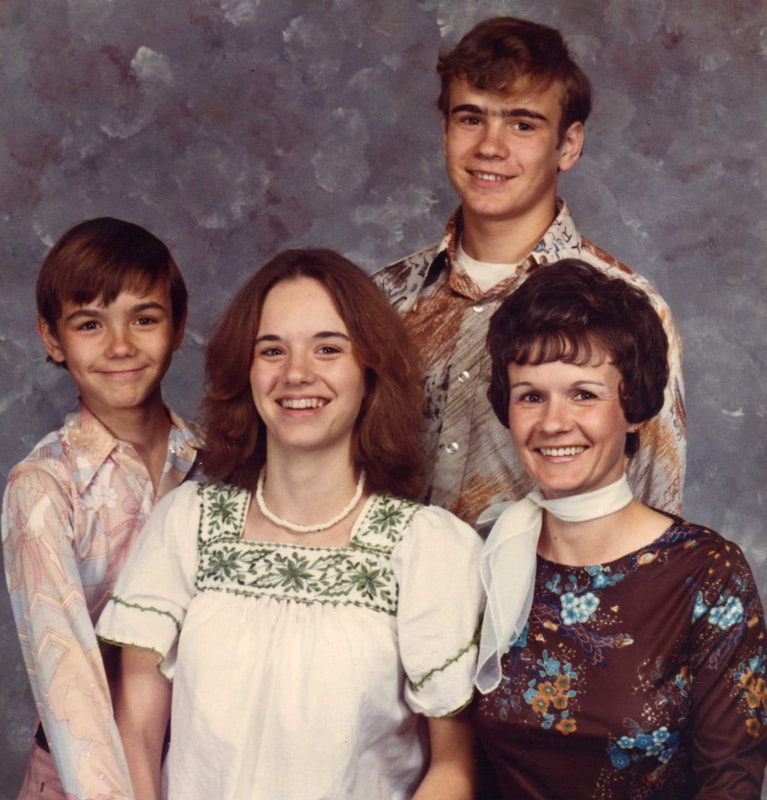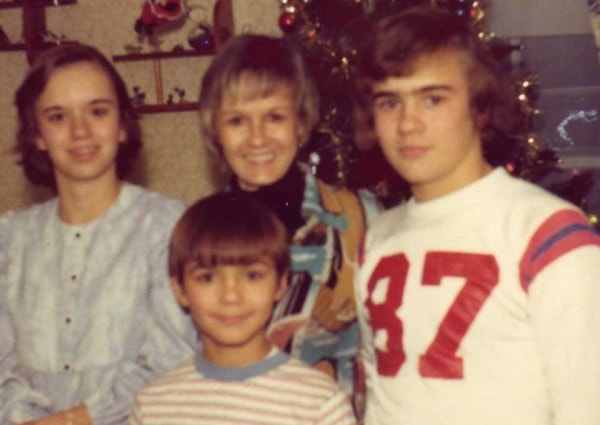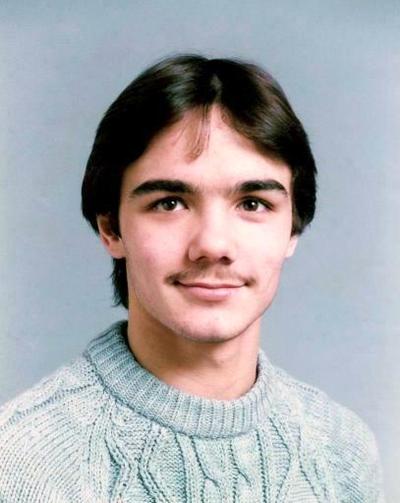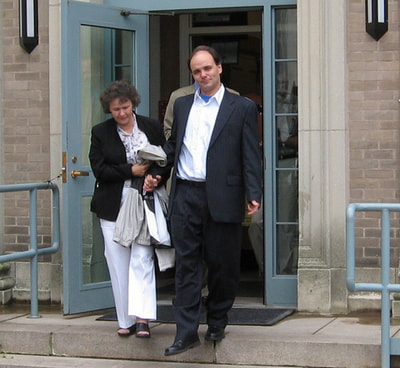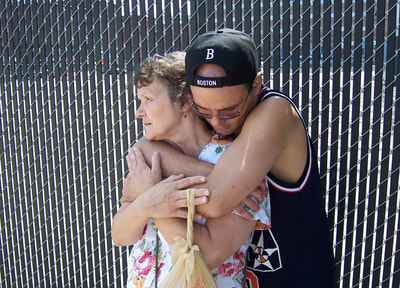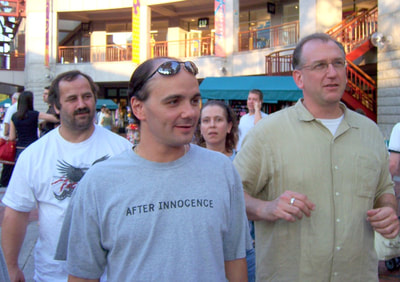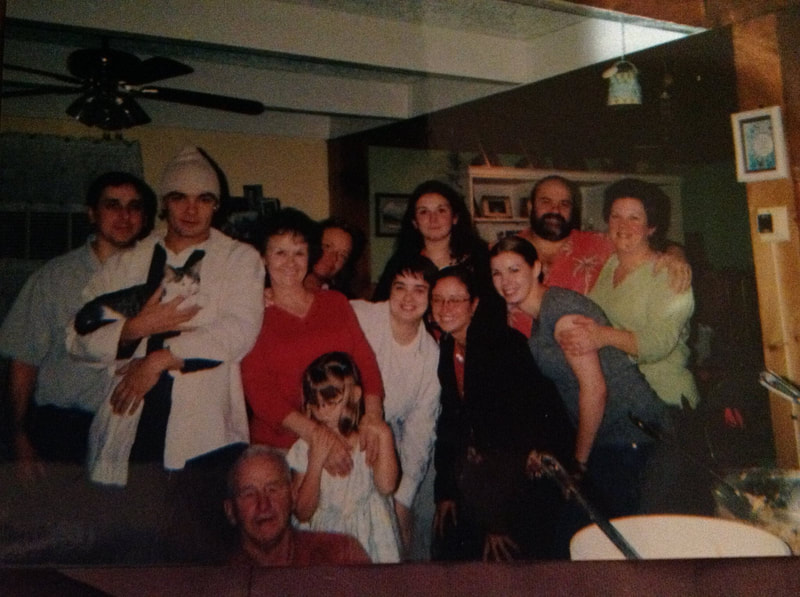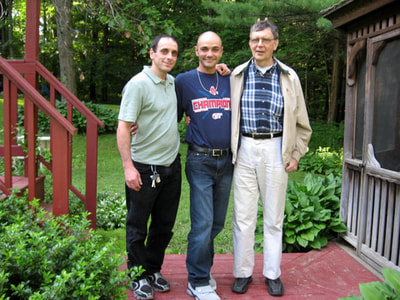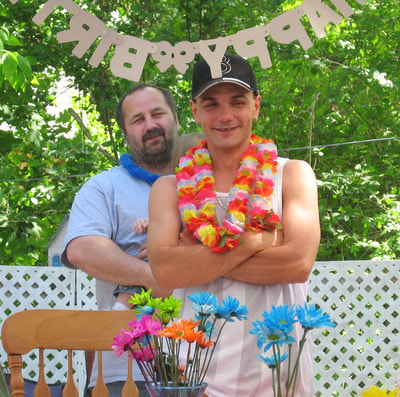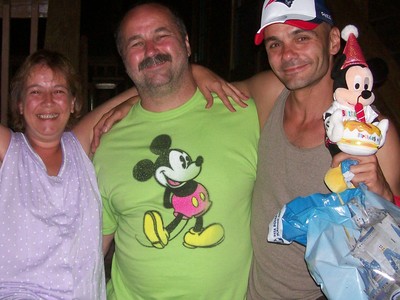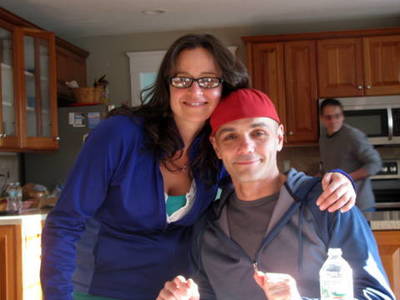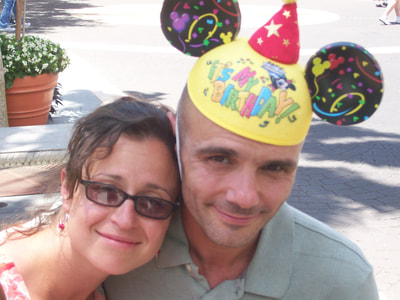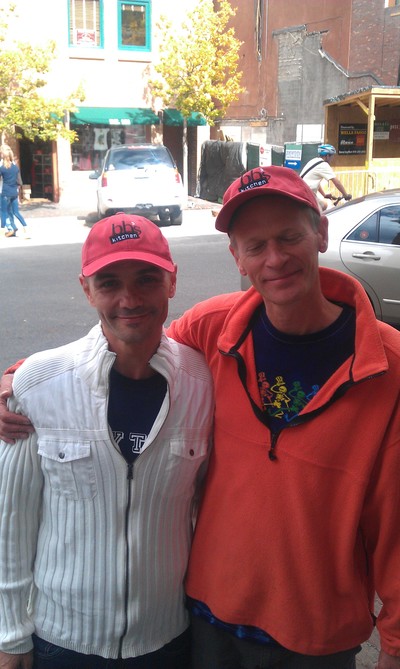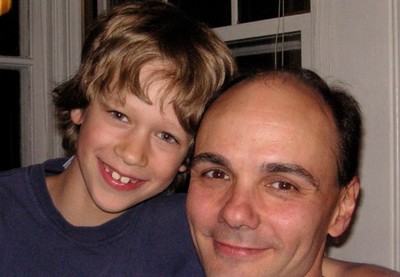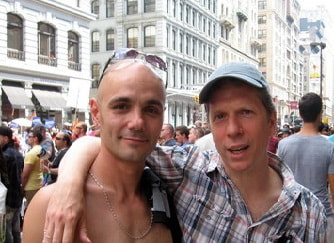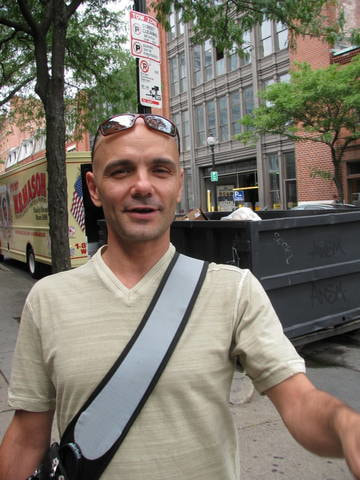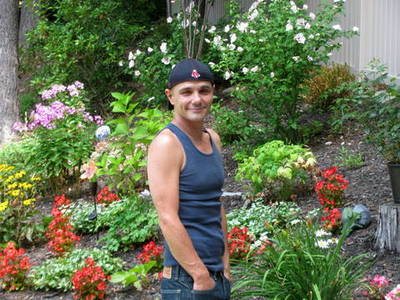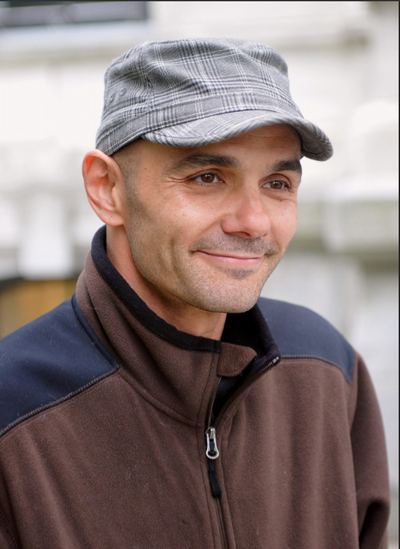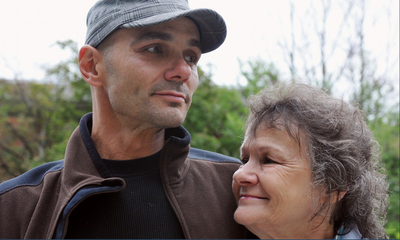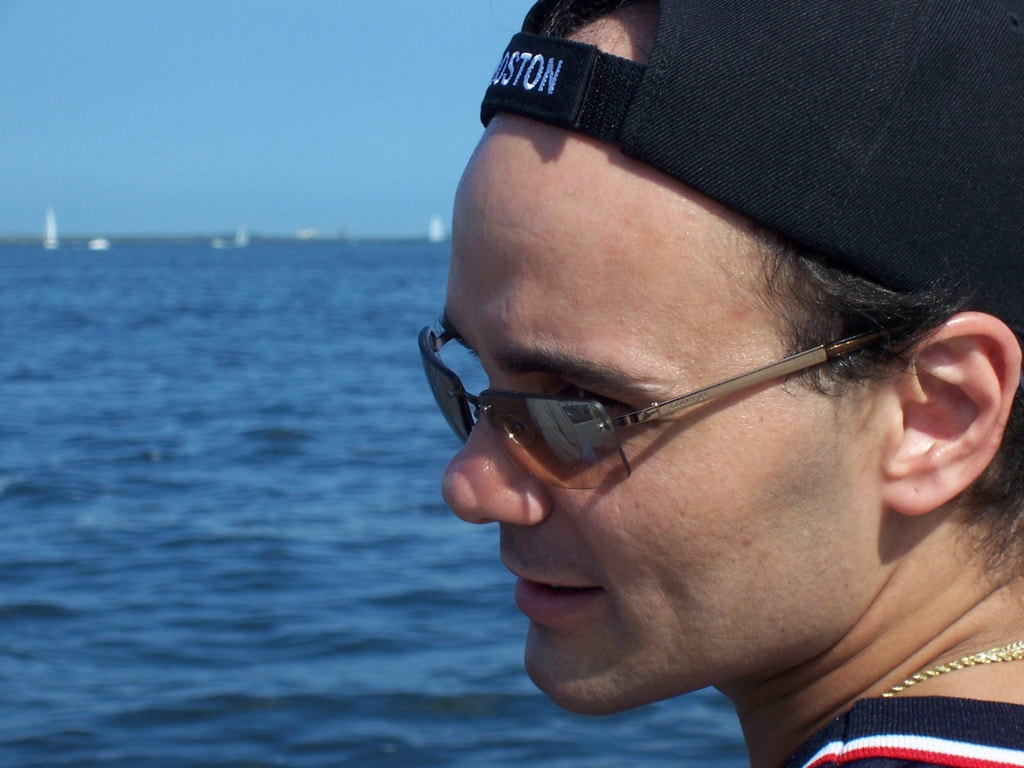Episode 5: Bernard Baran
"The only thing he was guilty of was being gay." From a child daycare center, to a prison that looked like a castle, to a messy birthday cake, this is the story of Bernard Baran, and the crime he didn't commit.
|
TRANSCRIPT
NARRATOR This podcast contains explicit language and mature content. This episode includes some discussion of sexual violence. It might not be appropriate for all listeners. BERTHA I didn’t care what they thought. I knew he was innocent. Mother knows things like this. The only thing he was guilty of was being gay. NARRATOR From Boston, Massachusetts, you’re listening to Mass Exoneration. These are the stories of people who were convicted of crimes — crimes they never committed — and what happened next, for them and for the people they had to leave behind. I’m Brian Pilchik. This is Episode 5: Bernie. BERTHA Hello. BRIAN Hi, is this Bertha? BERTHA Yes, it is. NARRATOR This is Bertha Shaw. She’s a mother to four children. One of them was Bernard Baran. Growing up, she called him Bernie. BERTHA Bernie was an average kid. He didn’t like sports. He tried baseball; he used to be afraid of the ball. He was always a, a very kind, gentle — he had a gentleness about him. And he, he was full of energy, they say hyper, but — he was full of energy. Always go, go, go. He liked music, always, as a kid. He liked books. NARRATOR But there was something about Bernie that made him different. BERTHA Bernie was very particular as a kid. He always liked to look just so. He was, he was very — and this is from the time he was young. His brothers wore jeans; he wore white jeans, with his shirt tucked in, and his best sneakers. And I said, "they’re gonna get dirty." He says, "no they won’t." And I said, "okay." And so when he’d go down the slide, he’d stop, brush off his pants, brush of his sneakers, and continue on. So he was very particular. I think he always felt different. And I do believe that a part of him knew he was gay, but there was a part of him that, that he wasn’t sure. NARRATOR When he was 14 years old, he told his mom. BERTHA Finally, when he told me he was gay, I said to him, I’ll never forget it, I said “you can’t be.” And he started to cry, and he said, "I am, mom." And I said, "you can’t be." And someone said to me, "Do you love him any less because he’s gay?" I said, "Look what they’re doing to gay people! I said they’re beating them, and everything else. I don’t want him to be gay, he can’t be gay." Because I had that fear, in the 80s, what they were doing to then. I was afraid that would happen to him. NARRATOR You’re going to hear all about Bernie. You’ll even hear from him — through the letters he left behind. But there’s a reason you’re not hearing Bernie’s voice right now. His mom was right to be afraid. Because in the end, Bernard Baran didn’t survive what was about to happen to him. It was the 1980s, in Pittsfield, Massachusetts. Coming out as gay was hard, the kind of thing that can throw your life off track. JOHN He knew he was gay from before, you know, before any of us met him. And he was intent upon living that life openly and freely. NARRATOR This is Bernie’s lawyer. JOHN Oh, I’m John Swomley. I have a law firm downtown in Boston that does criminal defense. And I was young and naïve when I first got involved in this case. NARRATOR Sometimes, you’ll hear John call Bernie by his first initial, “Bee.” That’s what a lot of his friends called him. Though, not everyone saw him as a friend. JOHN This was the 80s. This was not a — this was, there were people who were gay and you knew who they were, but there was certainly no acceptance. BERTHA The reason Bernie dropped out of school was because he couldn’t take the pressure of the teasing and all that. And he decided, you know what, I’m going to get out of school, get me a job, and build a life. In 9th grade, he finished 9th grade. JOHN He got a job as a CITA worker, if I’m not mistaken, working in a daycare. He excelled at it. He was fabulous. The kids -- he was just, he was friendly and warm. BERTHA When he would speak to kids, he would get down on his knees to be level with them and I have not met a kid that didn’t feel comfortable with him. Because of the way he was. He could relate to a 2-year-old, right up to 82, and every one of them would feel his comfort. Because I believe he had a gift that made you feel comfortable. NARRATOR But the parents of the kids at the daycare center — they saw it differently. JOHN One of the families decided that they didn’t want a "homo" taking care of their kid. And they complained about it to the staff at ECDC, the Early Childhood Development Center, that’s what I — what the daycare center was called. And they complained about it, and we have minutes from the meetings that they talked about “The Bernie Problem.” It wasn’t "The problem with the parents that have a problem with a homosexual that’s working in our daycare," it was “The Bernie Problem.” And nothing was done, actually, to the credit of the daycare at the time. They didn’t fire him, and after about a month of them not doing anything that family decided to take some action on their own. NARRATOR The parents went to the police. JOHN They ultimately leveled sex allegations against Bee. They said that their son had claimed he had had his penis squeezed to the point where blood came out of it, an allegation that doesn’t make a lot of sense. NARRATOR They were saying Bernie molested their child. The gay man at the daycare molested their three-year-old child. JOHN This was part of the daycare panic cases. This was the first one, in fact. NARRATOR Daycare panic cases. These were sweeping the nation in the 80s and 90s. That’s not to say that every accusation of sexual abuse was false. But this wave of cases, during this period of American history — many of them couldn’t be substantiated. Looking back, the New York Times calls it a “fever.” A “hysteria.” A “panic.” Parents accusing childcare workers of touching their children. Raping them. Sometimes, they said there were even satanic rituals. JOHN There’s a whole dynamic to a daycare panic case. And one of the weird ones is this neighborhood competition of wanting to be involved in what, the badness that’s happened, or this contagion of sex abuse that’s happened in this small town. NARRATOR And in a small town, the contagion travels fast. Other parents heard about what Bernie was accused of. They interrogated their own children. They talked to other parents. JOHN It was ultimately reported to the wife of the chief of police, who had a friend who had another child there. NARRATOR And the police came looking for Bernie. BERTHA He called the police station, because they were looking for him. So he called the police station. He said to his sister, "I wonder what they want me for?" She says, "I don’t know, they didn’t say." So he called the police station, and he went down there. They questioned him, and you know. We didn’t think a whole lot about it. But then, they arrested him. NARRATOR Bernie was held. The court set bail. BERTHA And we weren’t a family with money. I didn’t own my own house or anything. So I had a car, I got a bondsman, I got him out. Two days later they re-arrested him with more charges and I couldn’t get him out. NARRATOR More parents were coming forward; there were more charges. Bernie couldn’t afford bail. So he had to stay in jail while the prosecution put together a case against him. Bernie’s mom went to visit him. BERTHA And he was scared but said, “Don’t worry mom, it’s going to be okay. I didn’t do anything so, I’m okay.” NARRATOR Bernie told his first lawyer the same thing. "I didn’t do anything." The lawyer wasn’t so sure. BERTHA The attorney made me go back and talk to him again, well I was going anyway. I want you to go in, and talk to Bernie and ask him if he did this, you can get him help. I said, "You want me to say that to him," and he said, "yes." And I remember, I said to — I said, "You know Bernie, if you did things, we can get you help." And Bernie looked right into my eyes and said “Mom, I never would hurt a child.” In my heart, I knew the answer, even before he said it. I said to him, "I’m so sorry Bernie but the attorney wanted me to ask." And we both start crying. NARRATOR The prosecutor charged Bernie with molesting six children at the daycare center. They offered Bernie a deal. Less time in prison, if he would admit to doing it. BERTHA And they said they would give him 5 years if he pleaded guilty. And the DA told him, "If you don’t, I’ll make sure you get life." And when that happened, I felt like I couldn’t breathe. I thought, "Oh my god, what’s going on." And that’s when I knew things were going bad. And I thought, I said to him, "I want you to take the plea bargain, Bernie, cause I’m scared." He said to me, “Mom, are you there?” I said, "Yes, I’m here," cause I was trying to compose myself. And he says, “Mom, I don’t want to serve one day for something I did not do. You always told us to stand up for yourself if you’re right.” "That is right, we will fight," I said. Every year I hated myself for helping him make the decision that would take away his life. I probably could have convinced him. But we didn’t know what was in store for him. NARRATOR They went to trial. A jury would decide whether or not Bernie did it. A small-town jury. And there was a man who knew what would play well to that crowd at that time. JOHN First Assistant District Attorney Daniel Ford. NARRATOR Daniel Ford. The prosecutor. He needed to convince the jury that Bernie molested children. There wasn’t physical evidence, but he had something else up his sleeve. JOHN Lots of innuendo, and lots of horrible things that were said that were dog-whistle kind of things to turn a small-town jury into convicting Bee with no real evidence of any kind. NARRATOR Dog-whistles. Ways of saying, without actually saying: "He’s gay. He would do this." BERTHA Called Bernie a chocoholic in a chocolate factory. NARRATOR Ford told the jury that Bernie was “Like a chocoholic in a candy store.” That’s what it would mean to be a gay man surrounded by children. And it wasn’t just the innuendo. Ford called witnesses. The children. They had been interviewed by the police. They came in to court, and testified at trial. Young children, three and four years old, with ribbons in their hair. BERTHA You sit in that courtroom. And you listen to all the stuff they’re saying. And who are they talking about? That isn’t your son they’re talking about. I want to scream, I just want to say, "Can’t you see, stop looking at the ribbons in the hair and the curly dresses and listen to what they’re saying: It doesn’t make sense." NARRATOR It didn’t make sense because it wasn’t true. Bernie didn’t know it at the time, but the prosecution had been coaching the children. JOHN One of the more egregious ones, and it’s one that they didn’t actually end up using, was of a kid who pitched a fit in the middle of the tape recording, saying, “You promised me a prize. Where’s my prize? I want it, now!” NARRATOR Ford didn’t end up calling that witness. But he called others, and used similar tricks to get them talking: JOHN Even during the trial, in one of the cases, when one of the kids couldn’t make an ID or testify properly, he, Dan Ford, took this child out in the hall and promised them a hamburger if they would just get back out there and testify the way they were supposed to. NARRATOR The children did. They accused Bernie. Of taking off his pants. Touching their private parts. Threatening to kill their mothers if they ever told. BERTHA But the things they were saying were not, were not true. And the nightmare was just getting worse. And Bernie looked so scared sitting in there. And yet, he, with his lips, he motioned, “I love you,” to me, and I did it back to him. And during the trial, attorney says to me, "You’re not looking well, are you okay?" I says, "You don’t worry about me, you worry about my son; you need to do more." NARRATOR By the end, six children testified against Bernie. He faced five counts of rape, five counts of indecent assault and battery. BERTHA We were on trial for 5 days; the jury went in for 3 hours and convicted him. NARRATOR Bernie was sentenced to life in prison. CRYSTAL So I was about five, five and a half, when he just was gone one day. And until I was probably old enough to understand, they basically kept telling me he went away. NARRATOR This is Bernie’s niece, Crystal. CRYSTAL I’m Crystal Squires and Bernard Baran was my uncle. We grew up in a family that didn’t have much. And so you know, like, as families do, you pool your resources, when times get tough. So, when my mom was young, single mother, Bernie moved in with us when I was probably like 2. And lived with us, right up until actually he got taken away. So you know, in the beginning, he was always the one that put me on the school bus, got up with me in the morning, you know, was basically there for me. I remember one time I tried running away, and he talked me back with onion rings, which we always used to laugh about years later. How he ever did, I don’t know, cause I hate onion rings. I guess I didn’t back then. NARRATOR When Bernie first went to prison, the family didn’t explain to Crystal what was happening. CRYSTAL It wasn’t like Bernie went on a trip and he was coming back. Cause he’s gone on trips, and he’s come back. NARRATOR She remembers her first visits to prison. CRYSTAL They didn’t really start taking me to the prison till I think I was like 7. You know, as a kid you think it’s like a castle. Cause the only other time you’ve seen things with like, high stone walls and stuff is like in fairytales and stuff. So you’re like, "Oh, why does Bernie live in such a big castle?" And I honestly, vaguely remember some of what they told me. Obviously as you get older you realize it’s all lies, because he can never leave, that was always the thing. NARRATOR But Crystal’s family couldn’t keep it from her forever. CRYSTAL I think I was about 8 and there was an old article in a paper at a neighbor’s house that the father did woodworking in the basement and he had spread it all over the table. And we were down there playing with the neighbor’s kids and I said, oh, hey, that’s my uncle, Bernie. And I remember we weren’t allowed to play with those kids ever again after that incident. When stuff was first hitting that Bernie got arrested, and of course everyone believed what they read in the media. And so I just remember that night like a rock being thrown through my grandmother’s window with the word “faggot” written on it. And you know, that's even, I think I was about 6 1/2 or 7 years old, it wasn't something we ever talked about. Back then everyone was just so scared, because obviously people were thinking, you know, my grandmother raised a child molester. And that’s the way small town politics work. NARRATOR But when Crystal heard what he was accused of, she didn’t believe it. CRYSTAL None of my family ever believed he was guilty. So I was never told growing up that, you know, he was guilty or he did it. We were just, you know, we knew he was innocent. My grandmother always believed he was innocent, and that was the end of the story. BERTHA I didn’t care what they thought. I knew he was innocent. Mother knows things like this. The only thing he was guilty of was being gay. NARRATOR Crystal started to visit the prison with her grandmother, Bertha. CRYSTAL Most of my friends growing up never knew that I went to prison every Sunday with my grandmother. BERTHA Well I visited him as often as I could. CRYSTAL For us to go visit Bernie would be a 3-hour drive. So we were there as long as we could be there before we drove home. BERTHA I tried never to miss his birthday. One time I actually got to bring Bernie a birthday cake. CRYSTAL One time it was Bernie’s birthday, and we brought a cake. BERTHA And that was in Old Colony, before they stopped it. So, my youngest son was excited and we were bringing Bernie a birthday cake, decorated and everything, I made ‘em. We got there and of course you have to hand it over to the guards, and they went, and they came back, and they brought the cake and it was all cut. CRYSTAL And you know they would always cut things up to make sure people didn’t hide knives or drugs in it. BERTHA And so, when they brought it back to the table, the younger one says, he bursts out crying, he said, “Look what they did to your birthday cake, Bern”, he used to call him Bern. And I just got such a lump in my throat, I couldn’t even talk. CRYSTAL And he started crying and throwing a fit because he was mad that they cut up the cake. BERTHA And Bernie swallowed hard, and he leaned over to his brother and said, “You know what? Those guys just wanted to taste mom’s frosting. So they were licking the knife.” CRYSTAL Well don’t cry, they just knew grandma’s frosting was so good that they had to try it. BERTHA And then the both of them laughed. That just goes to show you how he could turn a situation around, make you feel good. NARRATOR The guards didn’t just search the cakes for contraband. They would search the kids, too. CRYSTAL So there was a time I remember all of us kids got strip-searched. And it was just one of those things you don’t forget cause you were in just a cold room, and you know these strange people were making you take your clothes off. So, any, you know, you were scared, trying to, obviously your parents were there, but it was still you know, traumatizing. And then they would, you know, talk you through it. "We’re gonna see Bernie soon, so try not to"...'cause if you were too upset, they would make you leave. The guards would, if the kids was too emotional or out of control, they wouldn’t let you go in. You’d have to calm the kid down. NARRATOR Strip searches, for children. And sometimes, the guards would come up with reasons why the kids shouldn’t be allowed inside. CRYSTAL And I remember one time they didn’t want to let me in because I had a button-up like shirt, dress shirt, and had a tank top underneath. And they said that it was provocative. Even though it was buttoned up to my collar — but because there’s like a white tee shirt underneath. I said to him, “Yeah, well that guy over there, you can see his tank top under his shirt, and he’s going in.” And then they said hold on, and they got a female guard come out and then she said, "She’s fine let her in." So. I was nervous, cause I was like, oh, I don’t know what they’re gonna do, but. I think I was like 15 at the time, when that happened. Oh, I was pretty ballsy, then. But I wanted to see him. You know? NARRATOR Bertha tried to prepare the children for each visit, as best she could. CRYSTAL You know every time we’d go to prison when I was older I got, my grandmother used to always give me the same speech going in, “Try not to cry.” Cause it would always be, you know, cause we could leave and he couldn’t. BERTHA And I’d say to her, "Crystal, you have to try really, really hard not to cry. Listen to grandma. We just go to the car, we can hug each other. Bernie has no one to hug. And it just makes him feel sadder. We gotta try real hard." And so, it got to the point where she could do it. And we’d get in the car and we would just cry. CRYSTAL We made it out the prison doors, but the minute we got in the car, we cried the five hours were we stuck in traffic? We cried so hard the whole way, it got to the point where we were both just so exhausted that we like, actually laughed at ourselves that we were crying that much. But we just remembered it was just, you know, we knew if we were crying that hard, he was in his cell crying that hard. And I can’t imagine what it was like on his side. NARRATOR On Bernie’s side, he was up against a lot. CRYSTAL You know, even in prison there’s a hierarchy. Which people who’ve never dealt with prison probably don’t know. But you know so, him going in to prison, 18 years old, 100 pounds — he had the worst rap there was. He was a "child-molesting faggot," basically, is how everyone looked at him. So, even in a prison hierarchy, he’s the bottom of the barrel. BERTHA In Walpole he calls me. And he’s crying so bad. And he says tp me, "Mom, I’m not gonna make it. I can’t, I can’t — I can’t do this. I’m afraid, I’m so scared." So I got off the phone. And I called the prison. And I said, “If anything happens to my son, you will regret it. I will have the attorney down there.” And then I called the attorney and had him call the prison. He says, "there’s really not much you can do," I said, "I need you to call." NARRATOR One day, Bertha got a call from another inmate in the prison. Someone who wasn’t her son. BERTHA And I almost didn’t take the call. And I, something inside of me said, accept it. So I did. And he says, "I gotta talk very quickly," he said. "Bernie tried to commit suicide. And he’s in the infirmary." You know that they don’t let you know that. So I went to the prison the next day, and uh, I went in there and I looked at him, and he was so pale, and he was trembling. And I looked at the guard and said, "Please let me hold my son." And he did. He said, "okay." And I held him. We both cried. And then I said to him, "Bernie, you make me a promise, from this day forth, you never do this again. Because I don’t know how, but one day, you’re gonna be a free man, the truth has to come out. You promise me right now." NARRATOR So he endured. CRYSTAL He got beat real bad. And he used to say to us, "oh you should’ve saw the other guy." NARRATOR And when people in prison think you molested children, you don’t just get beat up. CRYSTAL He told me things that, at the time he was telling me, I used to get upset. Like “If I die, I want this,” or “if this happens to me.” He said, "I know sometimes the stuff I say makes you nervous, but I didn’t know if I was gonna survive the next beating, or the next rape.” NARRATOR He wrote letters, to his mom, to Crystal. But he didn’t tell his mom about being raped. CRYSTAL Bernie had lied to my grandmother about that. I had read the letter, so I already knew the truth. But I never told my grandmother. How do you tell your grandmother that? NARRATOR When Bernie tried to kill himself, the prison sent him for an evaluation at the Massachusetts Treatment Center for Sexually Dangerous Persons. It’s a medium-security facility. A place where sex offenders weren’t at the bottom of the barrel. It would be a safer environment — he hoped. At the new facility, Bernie needed a way to survive. He could have tried to hide from the thing that landed him in prison in the first place: his sexual identity. Just try not to stand out. But Bernie took a different approach. JOHN And Bee was just flamboyantly gay, even in prison. He just -- CRYSTAL It was part of how he survived, too, believe it or not -- JOHN Yup. And he had, grew his hair down to his waist. He had beautiful, straight black hair and would, would just flop it around, and was just, he was a character. CRYSTAL They used to have a saying that I guess the guys would say to each other if they tried to invade on each other’s space or time, you know: "You do your time how you wanna do your time, I’m gonna do my time how I wanna do my time." So there was times where, if Bernie was just feeling like causing a ruckus that day, or he was feeling you know just excited, he used to put on his music. So, you know, they were able at one time to have TVs and boom boxes and stuff like that, so he used to get up on his tier and play his music really loud and people would yell “shut that shit off” and all the inmates would start ... JOHN It’s Mary J Blige. CRYSTAL Yeah, that’s what helped him get through prison. A lot of her songs, and if you know who she is, in the beginning her stuff is just so raw from the heart and sad. Alot of it was said, and it would help him. He would dance around and he would sing. We used to always joke, like “You cannot sing.” And he — “I don’t care!” He would sing louder. He would just — that was just his personality. If he — he loved music, it was probably his escape, you know? That — a way he could just be himself. And, you know, he used his gayness to survive, too because he won a lot of guys over that were homophobics, because they saw him as a sister, or someone in their family or a woman in their, a woman in his family. So, you know, even after he was, basically being gay got him where he was, he still never was not true to who he was, even though he knew it was going to make his life hell. NARRATOR And, in the end, it helped. CRYSTAL He ended up getting one of the most, the best job you can actually get in the Treatment Center. JOHN He worked in the employee kitchen. He cooked his way into the hearts and minds of the guards. He made pastries, he made anything and everything they wanted. And they loved him for it. But he worked his way up to being literally at the top of the food chain in the institution he ended up in, finally. And basically there were — he’d won over the guards, he'd won over the treatment staff. NARRATOR It helped that people inside started to believe that Bernie didn’t do it. JOHN Bee and um, was known to be innocent. He really was. And um, the head of treatment staff, Dr. Barbara Schwartz, has said to me on multiple occasions, I knew he was innocent. There’s only been three people in my entire life that I, I could tell and know definitively they were innocent and he was one of them. The other was Dennis Maher. NARRATOR Dennis Maher. Another innocent man. DENNIS My name’s Dennis Maher. I was wrongfully convicted. I spent 19 years, 2 months, and 29 days in prison. And I first met Bernie sometime in the 80s. I was convicted of rape, attempted rape, aggravated rape, and sentenced to 20 to 30 years, second degree life, and one day to natural life — which is a civil commitment as a sexually dangerous person. NARRATOR For Dennis, civil commitment meant that instead of spending his sentence in a normal prison, he would be sent to a different facility. The same place Bernie had been transferred to, after he tried to kill himself: DENNIS The Massachusetts Treatment Center for Sexually Dangerous People. And that’s where I met Bernie. CRYSTAL They were just two opposite people. Dennis is your man’s man, you know, hard gruff guy, and Bernie is just a sweet flower. DENNIS After we first talked, you know, he said that he was innocent. So that was something that we could both relate to. In prison, you know, it isn’t everyone says they’re innocent like people say. Sure, some people do who are guilty. But, me and Bee never said we were guilty. You know and then, and as years went along we became friends. NARRATOR For over a decade, that friendship grew. DENNIS We’d play sports together or, we’d sit down and talk. We started doing therapy together. And we'd talk about what it’s like to be an innocent man in prison, or how it all happened, or how we were being treated. You know, Bee had it harder than me because, he was gay. People might rape ‘em. Take advantage of ‘em. People think they’re gay, so it ain’t gonna matter if they rape them, or stuff like that. So that’s what I mean, he had to deal with other stuff. NARRATOR And when Bernie was dealing with the threat of rape, Dennis was there for him. DENNIS We would be on the block and if one of us was in a bad mood, the other one could — not in a bad mood, but having a bad day — we could tell. You know, and we’d just go and talk or give him a hug, something like that, just to know that it’s alright. Everything will be alright. NARRATOR Dennis and Bernie both kept fighting their cases, trying to get new trials. And then, one day Dennis got the news. DENNIS I ended up getting out before Bee. And that was hard because I knew it was gonna hurt Bee because I was leaving him behind. NARRATOR Crystal has a letter from Bernie. It’s dated 2003. He talks about what it felt like, his friend getting out — without him. Here’s Crystal, reading what Bernie wrote: CRYSTAL "One of my closest friends, Dennis, has left. He was cleared on DNA. He served 19 years for crimes he never committed. My soul was so torn with different emotions. I was happy for him, and happy that he would be living the dream he and I had talked about so many times before. I can’t even imagine his family’s happiness. My friend was going to be living our dream. But at the same time, I had this deep-down pain, knowing he was leaving me behind and I would now have to dream alone with no one to share it with." DENNIS When we were in treatment, we did a thing called a release plan. And that is your plan for when you get out of prison. And I told everyone, I said, "Listen, this may not happen, because I may die in prison as an innocent man." So I says, "I’ll do the treatment plan, but I’m not gonna write it down." I said, "I get out of prison through DNA. I take two months off. I get a job. I meet a woman. I get married. We have children and buy a house." So I got out through DNA. I took two months off. I got a job at Waste Management where I still work, I just went over 15 years. I met my wife online. We have two children. My son Joshua and my daughter Aliza, who’s named after the woman who got me out of prison. You know, and we own a house. So that’s the dream we used to talk about. NARRATOR A dream Dennis would get to live. Without Bernie. Bernie writes: CRYSTAL "I got a chance to say goodbye to him. About 10 guys showed up. So I felt a little out of place, as I always do. I don’t fit in; I’m not like them. That was another thing that me and Dennis, my friend, had in common. Everyone was sitting around, talking like our friend was going to be here tomorrow. It was driving me crazy — but yet, I could not find my voice. I finally stood up and asked my friend if I could hug him. I had been fighting back tears for the last 40 minutes, and I needed to say goodbye, no matter how hard it was going to be. When we hugged, my whole being hurt so bad. I just started crying ever so hard. We both stood in each other’s arms in front of everyone else and cried. I guess what shocked me was my friend Dennis cried with the same emotion I did. We held each other, shaking, like we were in the middle of an earthquake. In our embrace I told him I love him, and always felt like we had become so close that I felt he was family to me. Through our overwhelming crying, he told me he loved me too, and felt as if we were family. Then, without it going to my head, without warning, my heart spoke up, and told my friend that when I wake up tomorrow, I would be truly alone behind the walls of freedom. I felt so bad for saying that, because, as his friend, I wanted him to walk out of here not thinking about the people he left behind. I guess what I will miss most of all was the times we didn’t even have to speak to know what each other was feeling and going through." [Sorry] "Sleepless nights, allowing the fears to creep inside us. Wondering if we were ever going to go home. Hopelessness, wondering why me, not fitting in. All that an innocent man goes through. I could understand his pain, and he could understand mine. I will take solace through that unspoken bond that we share that still lives in the both of us. When I saw him on TV later that day, smiling and waving to his mom and dad, it made my eyes cry once again. But this time I cried with tears of joy." NARRATOR Bernie wasn’t sure he’d ever get out of prison. DENNIS He used to call me. I’d tell him, "You’d better call me." So he’d call and we’d talk. BERTHA He says, "Sometimes the days get so hard for me I get so down on myself and my situation I sometimes believe I will never get out of here, and if I do it’ll be too late." CRYSTAL "When we first started going to court, I never thought I would be here for another birthday. But it’s clear I will be. I’ve been locked up 20 years. I really thought my 40th birthday would have been the year I was celebrating my new life on the outside. On October 6, I started my 21st year incarcerated for crimes I never committed. I never thought I would still be here. Never. I have a hard time this time of year, with the holidays, Thanksgiving, my mother’s birthday, and Christmas. It is just too much loneliness for my heart to bear." BERTHA Like, he’d say, you sit around on Thanksgiving and you look all around ya, and your heart would ache for family, and you’d lose your appetite. You didn’t even wanna eat. CRYSTAL "I hope that my freedom will come soon. I look forward to — but also fear — the day I’m released. I have to start my life over in my 40s, with owning nothing. I try to save money, but being so far behind in life can really be overwhelming." NARRATOR Bernie wanted to be done with prison. But the future was frightening, too. And if he ever got out, he was afraid of moving back to Berkshire County. Back to Pittsfield. Afraid of how the town would react. CRYSTAL "I want so badly to go home. As much as I want to go home to my family, I will not, for fear someone in the area will still believe I’m guilty and try to hurt my family. I have learned to live with a lot of things: beatings, the hatred toward me, the awful memories of prison, the loneliness, and the nightmares of the court system. However, I could not live with the thought of putting my family in harm’s way. I cherish them too much. This is just one of the many fears that haunt me. I wish my mind could relax so that I could relax. I want one night’s sleep without wakening to my fears and nightmares. But one must always stay alert to survive in this world." NARRATOR Prison was already taking its toll on Bernard Baran. He needed to get out. To do that, he needed a way to challenge his conviction. He needed something new. His lawyers started looking into the children. The ones who testified against Bernie. The lawyers wanted to know: What happened in the interviews between the children and the police? The prosecutors were supposed to keep tapes of the police interviews. So Bernie’s lawyers tried to get them. JOHN The video tapes of the children and their interviews were missing. NARRATOR The prosecutor’s office wouldn’t turn over the tapes. They said they couldn’t find them. That went on for years. Until Berkshire County got a new District Attorney. JOHN Lo and behold he found all these video tapes in a stack in the corner of their file room in a — mixed up with a box full of, uh, OUI videos. And turned ‘em over. And then we were literally off to the races. At that point in time we sent them off to Johns Hopkins where Maggie Bruck had a bunch of graduate students rip them apart line by line. NARRATOR Dr. Maggie Bruck. A psychologist who worked at Johns Hopkins at the time. She and her students analyzed the videos. Looked at the way the kids were interviewed. And they found something. JOHN It was, it was a turning point in the case. NARRATOR Dr. Bruck came into court. They had a hearing, in front of a judge. JOHN She was able to — she’s done her own research. And she’s shown her, or she was able to show, I think, some of her own video research. One of which is, she takes real children that are going to a pediatrician. And she had a real pediatrician take a tongue depressor, and do basically two things to the child. Not put the tongue depressor anywhere near their mouth or any orifice. But run the tongue depressor down the bottom of the child’s foot. And then send the child home for three days, bring the child back, and have the child video-taped, with a doll and a tongue depressor, and ask the child to do what was done to her with the doll and the tongue depressor. And what you see on the video tape was that doll — that child takes that tongue depressor and sticks that tongue depressor in every orifice, everything you can find. And is just playing with the doll. NARRATOR Just playing. Dr. Bruck was able to explain something that had become understood with new research, and with a bit of time — removed from the 80s and the daycare panics. It turns out, if you don’t interview kids carefully, you can get them to say almost anything. So the kids, on the tapes, were willing to say Bernie did things to them: JOHN But they also said things like "Joey did it to me, Bobby did it to me." They were not focused. NARRATOR If Bernie’s jury had seen those tapes, or had heard from Dr. Bruck, they might not have believed the children. That, alone, might have changed the outcome. But there’s more. Back in the 80s, when the prosecutor wanted to charge Bernie with rape, he needed approval from a grand jury. A grand jury reviews some of the evidence before trial. If they thought the prosecution had enough evidence, the grand jury would allow the case to go to trial. But if not, Bernie wouldn't be prosecuted for rape. So the prosecutor showed the grand jury the interview tapes. Sort of. JOHN What happened in terms of Bee getting indicted was not that they actually showed those video tapes to the grand jury. They did not. Daniel Ford edited those video tapes. NARRATOR Once Bernie’s lawyers saw the tapes in 2004, they realized what Ford had done. Cut out all of the bad parts — whenever the children said that Bernie never molested them; that no one ever molested them. Whenever the police had to feed the children the "right answers." He deleted those parts. JOHN And edited them down to just the bits that were incriminating. And nothing else. And showed them to the grand jury and that’s how he got his indictment. NARRATOR Bernie’s lawyers went back to court. They argued that justice hadn’t been done. And in 2006, a judge agreed. Bernie’s conviction was overturned. The court had decided that Bernie’s original trial hadn’t been fair. But now the prosecutors had a chance to decide whether they were going to try him again. Bernie was free to leave — for now. But he had to wear a GPS bracelet. A band around his ankle that lets the government know where he is. Always. JOHN So we were successful in flipping the case, but the DA’s office could still go forward. And so he was, essentially, on bail. And his condition was that he be on a GPS and that he have a curfew, in my house, at 10pm every night. NARRATOR His lawyer’s house. Bernie didn’t have anywhere else to go. JOHN And when we got Bee out, he didn’t want to go back to the Berkshires. He was afraid of the people that are there. He literally refused to go back there. And what we did, and I asked my wife if she would allow him to come live in our house. And that first night, we threw the biggest party that we could possibly make happen, at Faneuil Hall, at one of these fish restaurants. Over the top. We had champagne. We had — we just were ordering everything and we were having the best time and someone mentioned either to me or to him that it was about 9:30, and we had to get him back to my house. And we were at a restaurant and my car was, I don’t know, 15 minutes away. And, we ran. We ran like crazy. We jumped on the pike and got off and got into my house at 10:01. To the phone ringing, it being the GPS people. And they asked where he was. And he said, "I’m right here." CRYSTAL And he said he didn’t sleep that whole night cause he was so just wired from being free. He said he didn’t sleep that whole night either, he just couldn’t. Like said it wasn’t real to him. NARRATOR In 2009, the prosecutors dropped the case. Now, Bernie was really free. CRYSTAL He had a sparkling personality. Like, one thing I always remember, meeting other exonerees and stuff. A lot of people carried a lot of bitterness around, which, who blames them for that. You spend so many years in prison and, and in a certain way it did affect them. You know? But I think one thing Bernie always tried hard to do, was, he always stayed positive. He always stayed his happy-go-lucky, carefree, self. JOHN He was able to be goodness and light, despite all of that. He was able to, not just project it, but it was him. It was his inner being, was, was — and I know he had dark moments — but he was a sparkle that was genuine, and it was to everyone. It was not just to the people he knew well. He could warm a stranger up better than, than anyone. CRYSTAL He was very child-like. And I think that’s why, you know, when you went and did something with him, it was, you know, it could just be, go to the grocery store for the first time, and he would just be so child-like about it. Like the holidays were the best time to go to the stores with him, because he wanted to touch everything and make everything work. And it was because all them years he missed, you know, so much and coming out he just enjoyed the little things. And it would be, for you, you would almost have to take a step back and like, you know, wow — I took, I took that for granted. But now, seeing it through his eyes, it was like you were seeing it for the first time. And you just always wanted to be with him. You just wanted to be around him. DENNIS Now, you did not want to go shopping with Bee. He was worse than an old lady. He would stop and read every package, look at everything, and walk at about two miles an hour. Stop and look. And I says, "Oh I’m gonna die here." But I would do it because I wanted to go hang out with Bee. NARRATOR He moved out of John’s house. His friend Dennis gave him a place to stay, for a while. He got a job landscaping. CRYSTAL He did gardens all over Boston. He did people’s properties. JOHN He made the garden in the front of my house. He totally redid our flowerbeds in the front and I get to see his yellow roses every year. CRYSTAL Yeah. Everything he touched when he was able to was just better than he left it. So it does make us feel good, you know, there’s beauty all over Boston cause of him. JOHN Mmm hmm. CRYSTAL To know him was to love him. NARRATOR Bernie passed away in September, 2014 — five years after the case against him was finally dropped. He died of a heart attack. Crystal was with him in the end. CRYSTAL He was 49. He didn’t make it to 50, unfortunately. It’s probably hard for people to understand — It’s hard to think about now that he’s gone. You know, we used to laugh about a lot of things after he was out of prison. John knows, we used to all do it together. Just like ways to I guess help Bernie get through prison life. You know, the stories he used to tell about prison, you almost used to think he was like an Avenger in there, kicking ass and taking names. And I wrote it to him a lot, which I’m glad I always told him, but. You know, he’s the most courageous person I know. To survive what he survived, and still not have a black heart from it all. I mean, to me? I have blackness in my heart because of things that happened to him. And yet he didn’t. So, even though he’s not here to lecture me anymore, tell me what I’m doing right and wrong, I still feel like he is. Because he was you know, so honest and loving, I mean. There wasn’t anything I couldn’t tell him. That’s one of the things I miss the most. JOHN The things that I miss are the things I won’t get to experience with him, that I just started to get to experience with him. He was the best side of me. He — I, I’m — I’m much more negative and bleak and angry and aggressive. And he, he softens you, he's, I — I my regret is that I’m not going to be able to spend the rest of my life with him. I actually thought that we would be friends for the rest of our lives. DENNIS He died on my birthday. My sister called me and said, Bee died. So the first thing I did — I think, the first thing I did was I called Crystal, to see how she was. And then I had to deal with, you know, my friend’s dead. He died on my birthday. I think he just wanted to make sure I didn’t forget about him. Which could never happen. Bee was my friend. He still is my friend. He may be dead, but, he’s still my friend. CRYSTAL There are a lot of people out here, I think, that take their lives for granted. And their freedom. I think he would just want people to know that he was a loving, caring person and that prison didn’t rob him of his heart and soul. And that’s probably what I think he would most want people to know about him. Other than that he was a good dresser and good looking. BERTHA I often think of what he could have done with his life. I think the truth of it is, together, we were strong. I don’t feel it anymore. I feel this deep sadness that I can’t even explain. And I’m angry, I’m so angry. Of what they took from him. When he got out of prison, I can’t even tell you the joy we both — it was our dream. Our dream came true. And when Crystal got married and I danced with Bernie, I actually felt — even though we were crying — I felt like we were dancing in the clouds. And I felt the most wonderful feeling. Bernie was like my piece of heaven on earth. When I was with him it was like, I was just, I felt light, and I felt good. Now he’s gone, I don’t feel that. I never felt that since. And I don’t think I ever will again. And I’m angry for what they did to him. And I’ll never get over that anger. I tried to do it, but I can’t. And now that he’s gone — I maybe could’ve gotten over some of that anger if he didn’t die. And the weirdest thing was. I didn’t even get to say goodbye to him. NARRATOR Bernie was 49 years old when he passed away. He spent 21 of those years in prison. CRYSTAL If people weren’t homophobic, it would’ve never happened in the first place. And, you know, to go in a small-minded town like that, someone just capitalized on it. True justice will never be done. The people who did this to him will never see even one day behind bars, never mind 21 years. NARRATOR Remember the DA who edited the tapes — Attorney Daniel Ford? The one who called Bernie a chocoholic in a candy store? BERTHA And the DA now got to be a Superior judge. And Bernie’s conviction helped him get that position. NARRATOR He became a judge in Hampden, Massachusetts. When people are accused of serious crimes, it’s his job to make sure they get a fair trial. CRYSTAL This just shows his heart, he's apologizing. "I’m very sorry about this letter’s contents. I just needed so badly to get some things out. I wish I had something happier to talk about. Thanks for listening." NARRATOR There were many other people who were part of Bernie’s story, who we didn’t have space to cover in this episode. You can learn more about Bernie — and everyone who supported him along the way — at massexoneration.com. That’s our last episode for this season. If you think these stories are important, please tell your friends about the podcast. Stay tuned for announcements about bonus content and our plans for what’s next. There are innocent people still in prison, right now. And when you’re not the one on the jury, it’s sometimes hard to know what you can do to help. You can start by making a donation to an organization like the New England Innocence Project, or whichever innocence program serves your community, so that they can keep fighting against wrongful convictions. Mass Exoneration is produced in collaboration with the New England Innocence Project, fighting to free people in Massachusetts, Rhode Island, New Hampshire, Maine, Connecticut, and Vermont. To help them provide lawyers to people like Bernie, visit newenglandinnocence.org. Mass Exoneration is recorded at the PRX Podcast Garage in Allston, Massachusetts. Their community recording studio provides equipment and training to storytellers, producers, and editors. Thanks to Alex and Ian for all of their support. You can learn more about what they do at podcastgarage.org. Lisa Kavanaugh is our Executive Director. Jeff Harris composed our theme. Ken Richardson takes our photographs. Betsy DelCiampo created our logo. Special thanks to Meaghan Sheridan, Tim Clarke, Schuyler Daum, [Marisa Dery], Alex Fernandez, and Erika Johnson for their help with this episode. Our podcast is edited and produced by Nicole Baker and me, Brian Pilchik. DENNIS My name is Dennis Maher, and this is Mass Exoneration. |
Photo Gallery
The photograph at the top of this web page was taken on June 2, 2009 by Berkshire Eagle Staff Photographer Ben Garver, and is reproduced with his permission. The images in the gallery below are provided courtesy of the many friends and family members who hold Bernard Baran in their hearts. Individual attributions are listed below.
Resources
CASE SUMMARY |
|
NEWS COVERAGE & COMMENTARY |
|
This episode is different from our others, because Bernard Baran was unable to participate directly in the telling of his story. We did our best to bring his voice to light through the letters that he wrote home, and through the memories of his loved ones. If you would like to hear clips of how he described his experience, in his own voice, we encourage you to listen to this three part BBC series on his case:
Bernard Baran Gets a Retrial
Update on Bernard Baran Case
Bernard Baran's Conviction Appeal
Two other people whose voices do not appear in this episode, Bob Chatelle and his partner, Jim D'Entremont, were instrumental in bringing the injustice of Bernard Baran's case to light. Bob and Jim first learned of Baran's case in the late 1990's, from a short account on the website of MIT professor Jonathan Harris. In June 1998, they were urged by their friend, journalist Debbie Nathan, to look into the case and to contact Baran's mother. After contacting her and meeting Baran himself, Bob and Jim brought attorney John Swomley on board and founded the Bernard Baran Justice Committee to raise funds for Baran's legal and expert fees. They also supported Baran with weekly visits for the many years leading up to his release. Bob went on to found the National Center for Reason and Justice (NCRJ) in order to help other innocent men and women. For a comprehensive account of the Baran case, please visit the website created by Bob and Jim for the Bernard Baran Justice Committee:
Case Summary by the Bernard Baran Justice Committee (last updated 2014).
Bernard Baran, Cleared of Child Molestation Charges, Dead at 49, Dick Lindsay (Berkshire Eagle, Sept. 3, 2014)
CONTACT US |
|
If you have questions or words of encouragement for Bernard Baran's friends and loved ones, we can pass them along.


